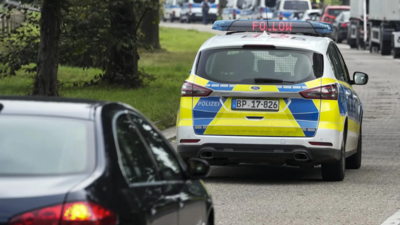Germany’s approach to free speech and crime has come under renewed scrutiny as authorities continue to crack down on online speech while appearing lenient on violent crime, particularly cases involving migrants. This contrast was further highlighted as CBS aired footage of German police raiding a private home and seizing electronic devices over a meme.
The footage shows six armed officers storming an apartment in northwest Germany, confiscating a suspect’s laptop and phone. Prosecutors claim the individual was involved in posting a racist cartoon online, an act deemed illegal under Germany’s strict hate speech laws. At the same time, over 50 similar raids occurred across the country as authorities sought to enforce censorship measures against online speech.
US Vice President JD Vance also joined in on the debate saying, “Insulting someone is not a crime, and criminalizing speech is going to put real strain on European-US relationships. This is Orwellian, and everyone in Europe and the US must reject this lunacy.”
Dr Matthäus Fink, one of the state prosecutors responsible for overseeing Germany’s online hate speech laws, explained the approach taken by authorities. “People are surprised this is illegal,” he said. “They say it’s free speech, but we tell them free speech has its limits.” The laws prohibit not just direct threats but also offensive remarks, reposting controversial content, and even liking certain posts.
Meanwhile, Chancellor Olaf Scholz has reignited the debate over free speech and democracy in Germany following a clash with Vance at the Munich Security Conference. On Saturday, Scholz rejected what he called “outsider” interference in German elections after Vance criticised Europe for shutting out far-right parties. The chancellor, whose country votes on February 23, defended Germany’s strict stance against including the far right in government coalitions.
Scholz directly addressed Vance’s remarks, recalling the US vice president’s visit to the Dachau concentration camp, where Vance reaffirmed a commitment to “never again” allowing such crimes. Scholz argued that this commitment was incompatible with supporting Germany’s far-right Alternative for Germany (AfD) party, whose members have been accused of trivialising Nazi crimes.
“A commitment to ‘never again’ cannot be reconciled with support for the AfD,” Scholz said. “That is why we will not accept outsiders intervening in our democracy, in our elections, in the democratic formation of opinion in favour of this party.”
Scholz’s remarks come amid growing controversy over Germany’s handling of free speech and political expression. Critics argue that while police aggressively pursue individuals for online speech, reports have repeatedly emerged of migrants facing lenient sentences or outright release despite committing serious offences. This disparity has fuelled public frustration, with many questioning the government’s priorities.
Vance had accused Germany of suppressing free speech by excluding political parties that voice strong concerns over immigration. “Democracy rests on the sacred principle that the voice of the people matters,” he told the conference, arguing that there should be “no room for firewalls” in a democratic system.







